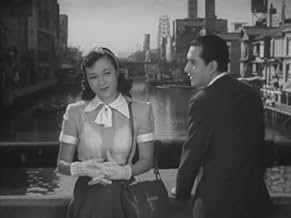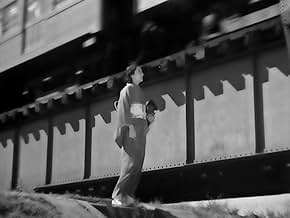Meshi
- 1951
- 1 Std. 37 Min.
IMDb-BEWERTUNG
7,6/10
1927
IHRE BEWERTUNG
Füge eine Handlung in deiner Sprache hinzuMichiyo lives in a small home in Osaka and is not happy with her marriage; all she does is cook and clean for her husband.Michiyo lives in a small home in Osaka and is not happy with her marriage; all she does is cook and clean for her husband.Michiyo lives in a small home in Osaka and is not happy with her marriage; all she does is cook and clean for her husband.
- Auszeichnungen
- 9 wins total
Empfohlene Bewertungen
Being a housewife in a working-class mews in Osaka has grown wearying for Setsuko Hara. Life with Ken Uehara is a dull routine of breakfast with him reading the newspaper, her scrubbing the house, and him coming home late to announce he's hungry. It all boils over when his flibbertigibbet niece, Yukiko Shimazaki, shows up. She has run away from home, rather than marry the rich man her parents have chosen. Uehara buys tickets to take them all on a Sunday outing. Setsuko stays home to scrub the tatami mats. She wants to run away to Tokyo and her mother. She decides not to. She's going to leave that night. Maybe she'll leave in the morning.
Mikio Naruse was one of the two principle directors of Shomin-Gekim dramas of the the working poor in Japan; the other was the revered Ozu, for whom Miss Hara often worked -- when Ozu died, she retired. Naruse's film looks far more like a conventional film than Ozu's -- moving shots, camera placement above the floor, and so forth -- but with this movie he tackles a story; Ozu may show the audience the working parts of his families -- because of their interchangeable casts, sometimes they all seem like the same family -- and how they work. His movies are group portraits. Naruse tackles the question of why they should work, why they should put up with the drudgery, and makes that voyage of self-discovery his film's story.
Bob
Mikio Naruse was one of the two principle directors of Shomin-Gekim dramas of the the working poor in Japan; the other was the revered Ozu, for whom Miss Hara often worked -- when Ozu died, she retired. Naruse's film looks far more like a conventional film than Ozu's -- moving shots, camera placement above the floor, and so forth -- but with this movie he tackles a story; Ozu may show the audience the working parts of his families -- because of their interchangeable casts, sometimes they all seem like the same family -- and how they work. His movies are group portraits. Naruse tackles the question of why they should work, why they should put up with the drudgery, and makes that voyage of self-discovery his film's story.
Bob
A sensitive look at an unhappy housewife, with fine performances by Setsuko Hara as the wife and Ken Uehara as the everyman schlub she's married to, and incisive dialogue and characterization by, among others, Nobel Prize winning novelist Yasunari Kawabata, this film ultimately succumbs to overly deliberate pacing, too many sub plots that go nowhere and add nada, a sexist ending that is an ode to wifely submission and a general sense, for me at least, that I'd rather be watching Ozu. Give it a B minus. PS...Coulda used more of the cat and less of Satoko.
Unsubbed, so I cannot really review it properly. Setsuko Hara is radiant though quite bland as the housewife who gets fed up with her husbands deroutes, especially regarding his (rather innocent) adventures with a young niece. She moves back with her relatives, but once hubby shows up in a more humble state, all is forgiven. I don't think much else actually happened, but the film is given to describing the everyday tasks and problems rather than great melodrama. Although Ozu is hailed as the great Japanese director for the Japanese, it seems to me that Naruse's film are more effortlessly showing the natural life of Mr. and Mrs. Japan, while Ozu's often come across as more staged tableaux. This is likely because of the invariably fixed and central camera Ozu employs, which makes the room in which a scene takes place appear as a stage and the action strictly choreographed. Compared with Ozu Naruse's camera is quite more engaged, however subtle the movements and variations may be, and he makes more frequent use of semi-close ups and reaction shots.
Gentle and touching portrait of a marriage. Setsuko Hara and Ken Uehara play a young married couple who have been living in Osaka for a while now, after having met and married in Tokyo. Life in Osaka is pretty dull, especially for Hara, who does little but housewife day in and day out. Uehara doesn't make much money, and his job prospects are weak. They're in a rut. When Uehara's beautiful young niece comes for an unannounced visit, Hara's dissatisfaction with life becomes too much to bear. As is usual for Naruse, the characters are extremely well developed and their emotional dilemmas are very easy to sympathize with. The acting is excellent throughout, with Hara giving one of her very best performances.
I've said this before in reviews here and I'll say it again: Stesuko Hara is a fantastic actress. She plays a housewife who after five years with her husband Hatsu (Ken Uehara) finds married life to be wanting. A visit from Hatsu's cousin, the very pretty, youthful Satako (Yukiko Shimazahi) brings further tension when she looks to spend time with Hatsu. Michiyo (Ms. Hara) doesn't know what to think, and, coupled with other instances like her husband coming home very drunk, suspects things. At times you see Michiyo clean in a way that suggests obsession, which could very well be just a way to mask the pain. Ms. Hara plays those scenes looking fairly dowdy, but when she dresses up to meet her old girlfriends, she is the radiant beauty that so often graces other great films she has acted in. One of the best things about this film is that during it you know what she should do, but, in a strange way, you don't want her to leave her husband. There are other smaller characters here, and they enhance the film. A fun scene for me was the tour of Osaka which Hatsu and Satako go on. I recently took a tour to Mount Fuji and the guide was exactly the same (except she spoke perfect English). It was just fun to see. Director Naruse, a master, wields a compelling story here and the casting of Setsuko Hara is an excellent choice. She is just wonderful. You can purchase this film with English subtitles in a box set released in the UK of Naruse which also includes "Sound From The Mountain" and "Flowing", as well as a book about the three films. I've not yet watched the other two films, but I will very soon. As for "Repast", I very highly recommend it. The combination of Mr. Naruse and Ms. Hara is inspired, dramatic and eminently watchable.
Wusstest du schon
- WissenswertesThis film revived the shomingeki sub-genre in which lower middle class and struggling families are depicted.
- Zitate
Michiyo Okamoto: [voiceover] My husband is sitting at the table. I bring a pot of miso soup from the kitchen. Yesterday, today, and tomorrow, for 365 days a year, morning and night, come and go unvaryingly. With a life restricted to the kitchen and the family room, must every woman grow old and die feeling empty?
Top-Auswahl
Melde dich zum Bewerten an und greife auf die Watchlist für personalisierte Empfehlungen zu.
Details
- Laufzeit
- 1 Std. 37 Min.(97 min)
- Farbe
- Sound-Mix
- Seitenverhältnis
- 1.37 : 1
Zu dieser Seite beitragen
Bearbeitung vorschlagen oder fehlenden Inhalt hinzufügen





























